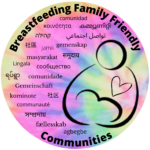COVID-19 has had a tremendous impact on our communities from businesses to schools to government services. Families finances are stressed, and many food pantries are feeling the strain of additional families in need of food support. How can this community partner – the Food Bank or Food Pantry – play a part in a Breastfeeding Family Friendly Community?
Breastfeed Durham recently posted information and resources to support breastfeeding family friendly Food Pantries. Here is an excerpt from their post. You can read the entire article at https://breastfeeddurham.org/food-pantry/.
Food Pantries Play a Critical Role
Many parents wonder if they have enough milk for their infants, even when the infant is growing and thriving. Providing formula to a family that is already successfully breastfeeding, or to a family that has not requested the formula, can undermine breastfeeding. Food pantries can help breastfeeding families by providing information about breastfeeding resources to support the parents’ decision to breastfeed.
Food pantries play a critical role in supporting breastfeeding families. It is important for food pantry staff and volunteers to understand how to support families choosing to breastfeed. It also is important for administrators at the food pantries to understand how to support breastfeeding staff and volunteers by providing them with adequate break time and space to express their milk or breastfeed their babies while working their shifts.
In the United States, nearly 90% of families choose to start breastfeeding. However, they need support from the community to continue breastfeeding their babies exclusively and for longer periods of time. In addition, studies show that families with lower incomes also receive less breastfeeding support, and they experience more barriers; thus, they often tend to stop breastfeeding earlier. Welcoming breastfeeding at the Food Pantry can provide the much needed support that the family needs to continue to breastfeed.
Support Breastfeeding Families
We encourage the food pantry staff to have a written breastfeeding friendly policy. A policy can provide information about the benefits of breastfeeding and ways to support the family’s decision to breastfeed. A supportive breastfeeding friendly food pantry’s written policy should include the following:
- Breastfeeding families are always welcomed and respected. They will never be treated poorly, asked to stop breastfeeding, or asked to cover up or move.
- We do not promote infant formula, coupons, or related products nor provide infant formula or other breast milk substitutes unless requested by the family.
- All lactating employees are allowed breaks to express milk or nurse their children and access to a private space for expressing milk or nursing. The space is not a bathroom; is lockable and shielded from view; includes an electrical outlet; and has hand hygiene available.
Suggested Step 1: Review Practices
- Resources – Offer breastfeeding information and resources, including information about breastfeeding basics; nutritional information for breastfeeding families; and connecting families with local community breastfeeding resources.
- Offer to provide breastfeeding education and peer support that is sensitive to languages spoken, images, nutritional restrictions, literacy levels, and family structures.
- Staff training – Different volunteers and staff have varying roles. Make sure that training and education is offered accordingly. Food pantries might hold trainings on:
- Why formula placement matters.
- What breastfeeding families need.
- Have a discussion within your staff about how you will support breastfeeding.
Suggested Step 2: Create a Breastfeeding Friendly Environment
- Choose members of your organization to be breastfeeding family friendly advocates, who will work to create or enhance a breastfeeding friendly environment in your food pantry.
- Identify families who are currently breastfeeding or breastfed in the past to assist and support other breastfeeding families.
- Display the Breastfeeding Symbol, stickers, window clings, or signage in a visible location and even on your website indicating that you welcome breastfeeding families in the food pantry.
- Set up a clean, comfortable private space for your staff, volunteers, and clients to express milk or breastfeed, while welcoming breastfeeding throughout the facility.
- Hang an educational poster in your breakroom, and educate your employees and volunteers about the food pantry’s commitment, policy, and practices for welcoming breastfeeding families.
Suggested Step 3: Implement the Policy
- Ensure that all staff receive copies of the breastfeeding policy (staff, volunteers, and others working with community members, especially those who have contact with visitors).
- Provide guidance on the breastfeeding policy for staff, volunteers, and others working with community members.
- Provide regular reminders (e.g. every six months) a staff meetings or volunteer training.
Check out more Stay aBreast posts on the Breastfeed Durham (NC) website Home Page, https://breastfeeddurham.org, for information and resources for breastfeeding family friendly communities.
Additional Breastfeeding Family Friendly Food Bank Resource
The World Alliance for Breastfeeding Action (WABA) offers this question in WABA Activity Sheet 10, Benefits for Communities.
Why should…families start their children off at a disadvantage when the best food is available to them? (Other) food banks view the promotion of breastfeeding as the best way to increase food security and decrease demand on…artificial baby milk.”
https://www.waba.org.my/resources/activitysheet/acsh10.htm
